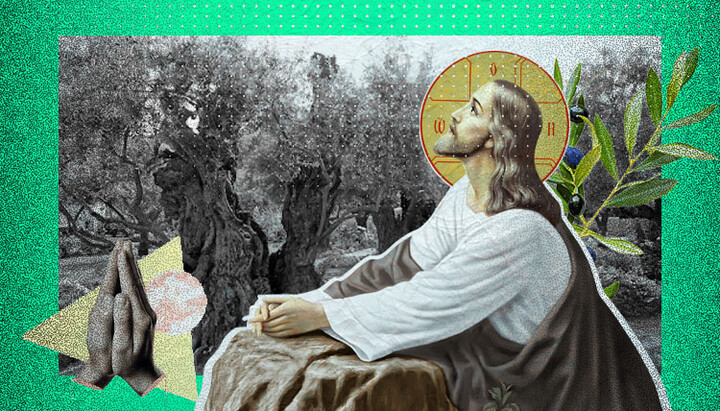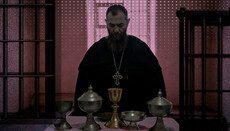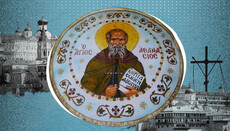What does it mean to “take up your cross”?

Why mere readiness to suffer is not enough. Let us talk about the difference between false humility and the true desire to suffer for Christ.
You can read the first part of this article [here].
Indeed, it is good for a Christian, in a peaceful and humble frame of mind, to accept everything that happens to him: all events of life, the outward circumstances, troubles from others, sorrows, illnesses, and even death itself.
The constant helper in such a blessed disposition is firm trust in God’s Providence, which cares equally for every blade of grass and for the Church of God, which has the promise that “the gates of hell shall not prevail against it.”
Nothing in the world happens without God’s will. And the misfortunes He allows are turned into blessings for His meek and humble children: “All things work together for good to them that love God, to them who are called according to His purpose” (Romans 8:28).
But lest self-love deceive us with the thought of an easy victory – over our passions, over the “old man” within us – let us remember: the condition of that victory is taking up one’s cross and following the Lord.
A conscious and willing readiness to lay down one’s life for the faith – this is what is meant in the words of the Mother of God: “I desire to suffer.”
Readiness or desire?
What exactly is required of us – a desire to suffer or simply readiness to suffer?
Suppose only readiness is required, and a person humbles himself in thought, agreeing to suffer. How will he behave when this humility is put to a real test?
Let us recall the young man in the Gospel who seemed ready for anything for the sake of the Kingdom of God. “Jesus said to him: If you want to be perfect, go, sell what you have and give to the poor, and you will have treasure in heaven; and come, follow Me. When the young man heard that saying, he went away sorrowful, for he had great possessions” (Matthew 19:21–22).
One decision was not enough. Now, to continue living, he must either go to the Pharisees, who will quickly calm him down, or somehow return to Christ. But how, if Christ has already given him a commandment that he does not wish to fulfill?
The commandment is: “Deny yourself, and take up your cross, and follow Me” (Mark 8:34).
In other words, accept suffering. But this cannot be done in a state of mere readiness without desire.
False readiness without inner desire will force a person to evade, to look for alternatives and compromises. For example, when faced with church temptations, clever people quickly invent modernism, ecumenism, and other “solutions” of that ilk.
“I am going to Rome to be crucified again”
Why does the Mother of God, when the hierarchy of a persecuted Church worries about protecting its property from destruction, give no direct command but only sets Herself as an example: “I desire to suffer”?
We must assume that in those two words the Queen of Heaven said exactly what was needed. The Apostle Peter expressed the same thought a little more fully: “For this is commendable, if someone endures pain while suffering unjustly because of consciousness toward God. … For to this you were called, because Christ also suffered for us, leaving us an example, that you should follow His steps” (1 Peter 2:19–21).
Let us remember the story: the holy Apostle Peter was in Rome when Nero began his persecution of Christians. The disciples persuaded him to leave the city. Having gone out, Peter met Jesus Christ on the ancient Appian Way. When he asked, “Lord, where are You going?” (“Quo vadis, Domine?”), the Savior answered, “I am going to Rome to be crucified again.”
As we see, in a situation much like ours, the Lord said no more than what the Mother of God said.
In these words lies the spirit of the Gospel.
Peter needed no further words to return to Rome and ascend his own cross – he knew for Whom he was giving his life.
Salvation of shrines or salvation of the soul?
Where should we direct our efforts in times of persecution: toward fulfilling our Christian calling, or toward preserving church property? Perhaps God sometimes allows it to be plundered precisely because, being overly concerned with the outward, we forget about the inner work of our salvation?
Even while striving to protect the treasures of the Church, one can lawfully suffer.
Only we must remain faithful in what is essential: in the dogmas of faith and in devotion to the Mother Church.
While zealous for the temples of God, we must not contradict the spirit of the prayer “Our Father.” The defense of holy things must be impartial, without anger, without scandal or judgment, entrusting everything to the hands of the Lord, who said: “Vengeance is Mine; I will repay” (Hebrews 10:30).
If we return to the concepts of readiness and desire, readiness ends at the foot of the cross, and the hands by which a Christian takes up his cross are called the desire to suffer.
Readiness is the state of the catechumen. The faithful are called to something more – to translate this readiness into desire, through the rejection of the soul “with its passions and lusts” (cf. Galatians 5:24).
“Give blood and receive the Spirit” – thus simply and briefly the holy fathers expressed this spiritual law.
“There are no uncrucified in paradise”
What happens if one begins to seek salvation without understanding the path of salvation? Do all who come into the Church remain in it? Do those who remain never grumble? And why do they grumble? Because the path of salvation is the cross.
Let us not blame the Church for what seems amiss in her. St. Isaac the Syrian warns: “God bears all human weaknesses, but the murmurer He does not tolerate, unless He punish him.” Why not rather seek the fault in ourselves – that we lack true faith, knowledge of the meaning of life, and understanding of the Cross?
St. Silouan the Athonite said: “There are no uncrucified in Paradise.” St. Ignatius (Brianchaninov) said the same: “He who is not crucified is not Christ’s.” If we do not know this, the fault is ours – we have not wished to learn.
The Lord never promised that everything in His earthly Church would be orderly, and we have no right to demand that order either from Him or from His servants. The Lord has His own order – He seeks those who seek Him.
St. John Chrysostom, addressing those who stumble, gives the example of Abraham: “What priests did Abraham have? What teachers? … He himself had a wise soul, and that was enough.” He also gives the example of Noah, who remained righteous “when the whole world was engulfed in evil,” and his son Ham, who had the best of teachers in his father yet was wicked. He recalls Job, who “having nothing external, showed every form of virtue with great zeal.”
Finally, Chrysostom speaks of Judas, who did not obtain salvation even from Christ Himself. He saw miracles, worked them himself, heard the teachings of the Kingdom and of Gehenna, took part in the Mystical Supper – yet “fell into madness and became a traitor.”
All this, says the saint, is to show that one must not be scandalized by anything or anyone.
The only way out is in God
World events are inevitably moving toward their apocalyptic conclusion. The Lord promised to save everyone who strives for salvation: “Him that cometh to Me I will in no wise cast out” (John 6:37).
When there is disorder in the world, there will also be disorder in the Church. A Christian who wishes to be saved will inevitably need to discern precisely where the grace-filled Church of Christ is.
The Church preserves the truth, and we must know it and never lose it.
Let us recall the words of the spiritual father of the Kyiv-Pechersk Lavra, Archimandrite Avramii (in schema Agapit): “Christians, my children, must without fail carry their cross. … All that remains is to cry: ‘Lord, help!’”
But what are we to do when, though already baptized, we not only flee from our crosses but are even offended by the preaching of Christ’s Cross? The apostles are no longer with us. Living teachers of faith and repentance are almost gone. We are too lazy to learn from books.
Baptized without any preparation, we are thrown into a hostile world and must admit: this is our cross – a cross wrought by ourselves and by our forebears.
There is only one way out – upward, through the Cross, to Christ. But who will teach us and give us strength to overcome within ourselves the unwillingness to suffer?
Let us look intently at the example of Christ Himself. Did not His human nature show weakness? Let us recall His prayer in the Garden of Gethsemane: “My Father, if it be possible, let this cup pass from Me; nevertheless, not as I will, but as Thou wilt.”
It was precisely in this prayer and struggle that Christ’s “I DESIRE TO SUFFER” rose to the very summit of His human humility.
This image of struggle and prayer the Savior left us – to strengthen our own frail desire to follow Him.












